
“With every day…I thus drew steadily nearer to that truth…that man is not truly one, but truly two,” Robert Louis Stevenson wrote in his novella, Strange Case of Dr Jekyll and Mr Hyde.
Steeped in the fiendish Gothicism of the late 19th century, Stevenson’s 1886 masterwork tells the story of two seemingly separate characters: Dr. Jekyll, a well-liked doctor who was prone to occasional scientific quackery, and Mr. Hyde, a devilish proto-human with a lust for immorality and mischief. But when Mr. Hyde takes his crimes to the streets, a discovery is made: the two characters are the same person.
Stemming from the Victorian fixation on the bifurcated self of the upper classes, Stevenson’s work wasn’t alone in exploring the idea, with other literary mammoths such as Mary Shelley and Fyodor Dostoevsky writing on the concept in their own works.
Stevenson splitting one character into two has a greater meaning, of course—that individuals themselves are dual-natured creatures. Jekyll and Hyde have become an old trope used in everything from movie plots to small talk.
Can this idea of duality be applied to a country? Have Canadian politics and policy ever reflected the opposites of Dr. Jekyll and Mr. Hyde? Is Canada’s global reputation as the well-mannered do-gooder really its reality?
An answer to these questions might come from an unlikely source—the Iraq War.
In March 2003, as the U.S., U.K., Australia and Poland launched a bombing campaign on Iraq, Prime Minister Jean Chrétien declared that Canada would not participate unless the attack was sanctioned by the UN Security Council.
“It was an illegal invasion,” then-defence minister John McCallum told Legion Magazine, “and we didn’t want to participate.”
Canada’s stance surprised many around the world.
“[We] were very pleased,” said McCallum. “Chrétien made the announcement, and I think it’s really one of my greatest moments in politics to be involved in that.”
In 2013, on the war’s tenth anniversary, Chrétien told CTV’s “Power Play” that “it was a very important decision. It was, in fact, the first time ever that there was a war that the Brits and the Americans were involved and Canada was not there.”
But now, 20 years since the U.S.-led invasion of Iraq, more details are emerging about the role Canada’s military played in the conflict despite the country’s political stance. It’s a strange case, indeed.
“While Canada didn’t officially join, it was [one of the] biggest contributors to the Iraq War,” author, academic and political activist Yves Engler told Legion Magazine. Engler helped organize an anti-Iraq War demonstration in Montreal on Feb. 15, 2003, which included 100,000 protesters and was then the country’s largest such protest.
Indeed, the government’s official stance and what it actually did “[was] an incoherent position,” said Eugene Lang, McCallum’s chief of staff at the time, of the situation. “[It] was very controversial.”
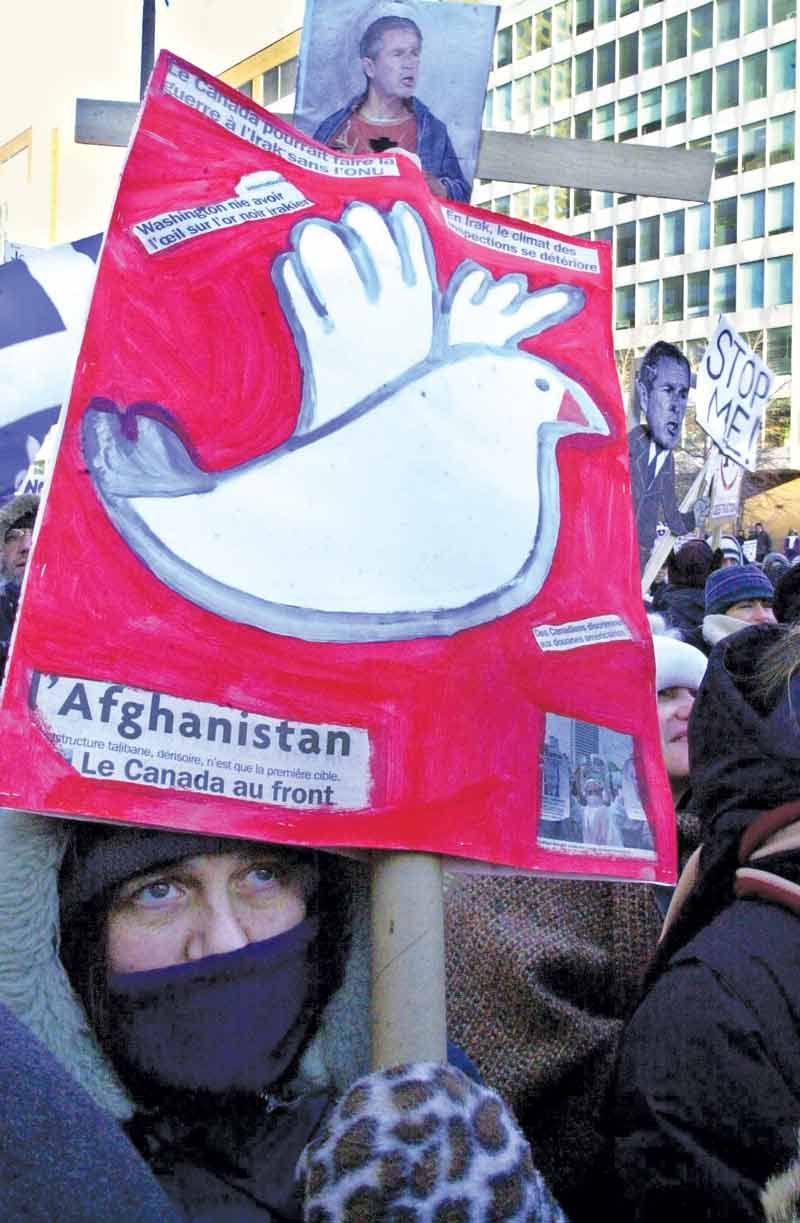
In early 2003, the already tense diplomatic relationship between Iraq and the U.S. turned even more delicate. After the former’s invasion of Kuwait failed, thanks to an American-led coalition response during the 1990-91 Persian Gulf War, the two countries had turned to political sparring.
Iraq’s President Saddam Hussein had remained in power after the conflict, though he, like most Iraqis, had a strong distaste for the foreign interference. The UN had imposed economic sanctions and military inspections on Iraq in the hopes of preventing its development of biological, chemical or nuclear weaponry.
By 1998, Iraq’s continuing disregard for the UN bans and inspections led then-U.S. president Bill Clinton to initiate Operation Desert Fox, a four-day bombing campaign of Iraqi military targets in December.
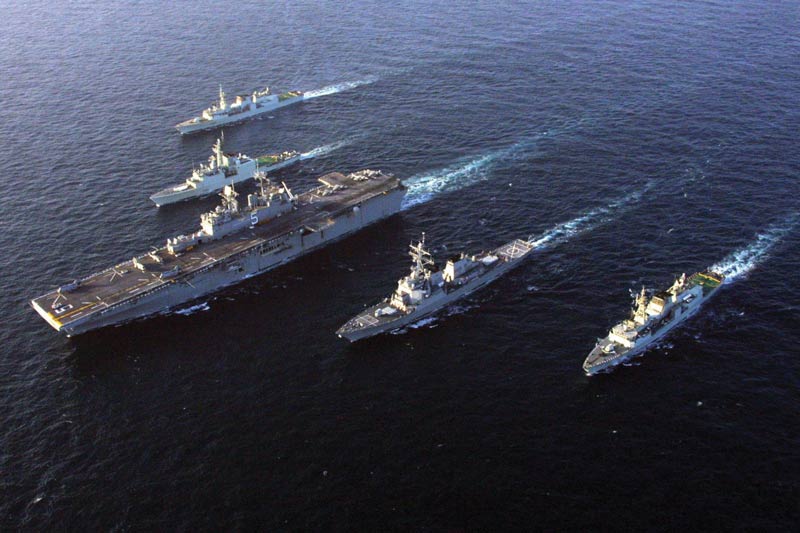
The tension between the two countries continued into 2002 when U.S. President George W. Bush, still reeling from 9/11, claimed Iraq had weapons of mass destruction and long-range missiles. Though no such stockpiles were ever found, the threat of their potential existence stoked fear among many Americans. Still, even after Iraq complied with a subsequent UN Security Council resolution on weapons inspections in November, Bush was adamant in his stance.
On March 17, 2003, he gave Saddam an ultimatum: give up the presidency and leave Iraq within 48 hours or face a “military conflict commenced at the time of our choosing.” Saddam ignored the threat and the U.S.-led invasion of Iraq, dubbed Operation Iraqi Freedom, began on March 20.
The pressure was mounting, meanwhile, for Canada to join the international “coalition of the willing” as Bush termed it, with the Americans and some 40-plus other countries.
But on the same day as Bush’s ultimatum to Hussein, Chrétien remained steadfast: Canada would not be involved in Iraq, he vowed in the House of Commons.
However, just days later, the U.S. ambassador to Canada, Paul Cellucci, told the Economic Club of Toronto: “Ironically, the Canadian naval vessels, aircraft and personnel in the Persian Gulf…will provide more support indirectly to this war in Iraq than most of the 46 countries that are fully supporting our efforts there.”
Indeed, while it would be revealed nearly a decade later, a classified U.S. diplomatic document obtained by the CBC through the whistleblower website Wikileaks confirmed that on the very day Chrétien said Canada would not participate, senior Canadian bureaucrats promised American and British officials that the country would “be discreetly useful to the military effort.” Jekyll, meet Hyde.
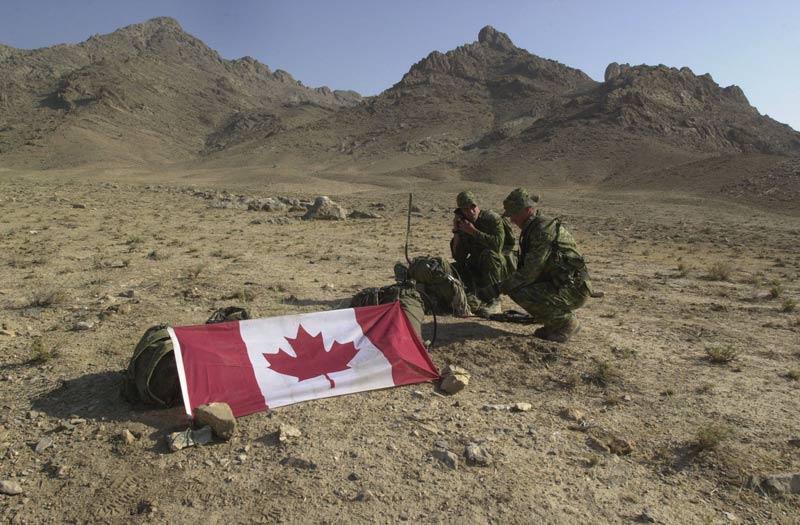
“The Canadian personnel in the Persian Gulf will provide more support indirectly than most of the 46 countries that are fully supporting our efforts.”
At the time, Canada had more than 1,200 naval personnel in the Strait of Hormuz at the mouth of the Persian Gulf and Chrétien had promised they would continue their part in the larger war against terrorism that had commenced after 9/11.
“The two ships in the Straits now are being augmented by two more en route,” the classified document noted, however, “and there are patrol and supply aircraft in the UAE which are also prepared to ‘be useful.’”
While these vessels were to remain part of Operation Enduring Freedom as the battle against terror was known, Lang confessed to CBC that this principle might not have necessarily translated in practice.
“But who knows whether in fact we were doing things indirectly for Iraqi Freedom? It is quite possible,” Lang told the national broadcaster.
Additionally, the classified document detailed that Canadian military personnel who were part of exchange programs with British and American units would remain in their positions: “A very small group of Canadian military personnel who are…not in combat roles…will not be removed.
“The Deputy Foreign Minister stressed that, even though they remain unable to endorse military action…Canada remains a strong friend and ally of both the United States and the U.K.”
“I mean, [the Americans] didn’t like it,” said McCallum. “But they lived with it. And we went on.”
“It was an attempt to…not be supportive of the Iraq War in a political and legal sense,” Lang told Legion Magazine, “[while] also not doing things that would…further strain Canada-U.S. relations.”
Lang also noted that some of the military personnel who stayed on were involved in military planning and other Iraq military operations. “I never knew exactly how many were involved with military planning and possibly involved in some other operations,” said Lang.
In his research, Todd Gordon, an associate professor of law and society at Wilfrid Laurier University in Waterloo, Ont., asserted that many of these officers fought alongside the U.S. military and even took command positions in occupying forces.
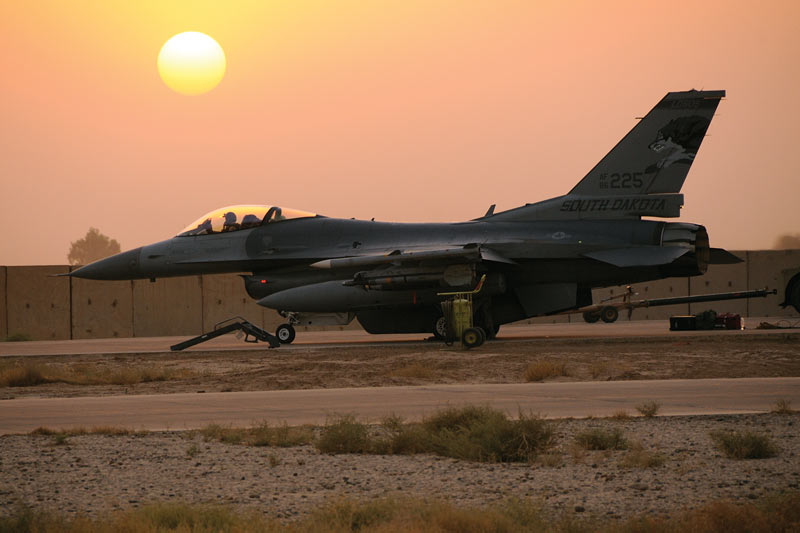
Not only did some exchange officers serve, but Canada’s future defence chief Walter Natynczyk served as the deputy commanding general of 35,000 U.S. soldiers in Iraq in 2004.
“[Natynczyk] was on exchange in the U.S. military, and he was stationed… [at] a planning headquarter[s] in Kuwait,” said Lang. “[This] headquarters, after a little bit of time, moved into Iraq, and he was actually at one point in time on the ground.”
Upon learning of Natynczyk’s role, then NDP leader Jack Layton told the House of Commons: “When it comes to having someone in charge of thousands and thousands of troops in a war which is illegal and should never have happened…this makes us complicit in the unilateral philosophy of George Bush and his administration.”
Lang, meanwhile, also revealed that before Canada had made an official decision on participating in the Iraq War, the government had led the creation of a multinational, multilateral task force to simultaneously advise on both the war on terror and Operation Iraqi Freedom.
“This caused a lot of debate inside the Canadian government about what to do,” said Lang. “Would we have to relinquish command of the task force because we’re not involved in Operation Iraqi Freedom, and this task force is double-hatted?”
While the task force continued, the apparent contradiction of that decision remained.
“It’s hard to imagine…you can have command of a task force that has two commanding theatres of operation, and you’re not involved in one of [them],” said Lang. “We convinced ourselves that this could be done.”
“Our position on Iraq was,” said Lang succinctly, “trying to be ‘half-pregnant.’”
Sean M. Maloney, historical advisor to the chief of the land staff during the war in Afghanistan and a professor of history at Royal Military College in Kingston, Ont., has studied Canada’s involvement in the Iraq War closely.
“Some diplomats and analysts suggest that it is enough that ‘Canada is there,’ that some form of low-risk or minimalist partici-pation in operations should be
pursued as policy. This is fallacious reasoning and ignores the realities of alliance politics and national interests,” Maloney wrote in a 2003 working paper for the Institute for Research on Public Policy called “Are We Really Just Peacekeepers? The Perception Versus Reality of Canadian Military Involvement in the Iraq War.”
“Canada…must be able to provide a unique capability that no other nation can bring to the table,” Maloney continued. “Canadian commitment must be militarily significant….If it is not, it will be ignored.”
Some scholars and politicians, however, believe this all points to a greater issue, the real writing on the wall: Canadians are not peacekeepers.
“[The] ideology [of peacekeeping] neatly taps into latent feelings of post-colonial insecurity and anti-Americanism lying dormant in the Canadian psyche,” wrote Maloney. “Peacekeeping is altruistic, peaceful and good. War is selfish, violent and bad.”
Lang noted that Canada hasn’t done much feel-good peacekeeping since Lester Pearson was in power, with most operations from that era being Cold War holdovers where support troops or short-term missions with small numbers of soldiers were called for.
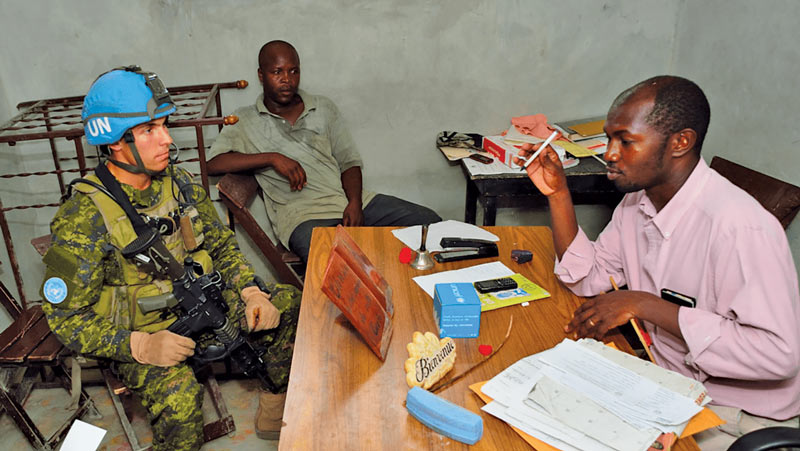
Canadians, however, have yet to shift from this mid-20th century mindset, and the past 25 years of Canadian military history have proved how cracked the mythology has become.
“Canada has a sanitized popular culture that reinforces the peacekeeping ideology, not the historical reality of Canada at war,” Maloney told Legion Magazine.
Maloney noted that Canada participated in three out of the four major wars in the 1990s when the U.S., Britain, Australia or NATO was involved, including six military interventions and 12 combat stabilization operations.
Engler believes that Canada’s alleged involvement in overthrowing the Haitian government in 2004 was the nation’s bloodiest example of its non-peacekeeping nature.
“It was a terrible, brutal coup that killed thousands of people,” said Engler. “And Canada was backing it in so many different ways.
“This whole myth of Canada being a peacekeeping nation, a benevolent international force, is absolutely not founded in historic fact.”
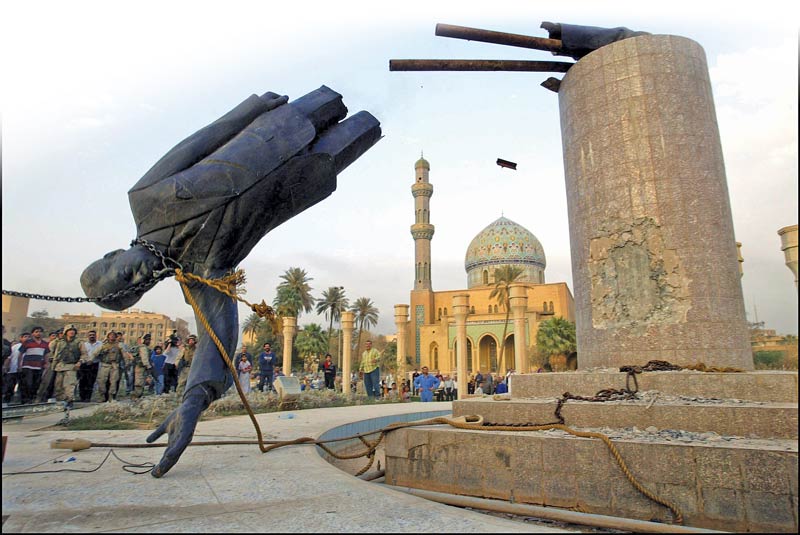
Irrespective of Canada’s war policy, however, U.S. forces invaded Iraq through neighbouring Kuwait and found little resistance to their advances—except from the Fedayeen Saddam. The Iraqi President’s paramilitary “men of sacrifice” fought relentlessly against the attackers in the country’s south.
Meanwhile, in central Iraq, the Republican Guard was set to defend the capital of Baghdad. Despite inclement weather putting a pause on U.S. army and marine battle operations on March 25, the American air force was still able to do enough damage to the Iraqi army’s top unit that it took control of the city’s airport on April 4. The U.S. took the entire city by April 9. That same day, the Brits secured the southern city of Basra as well.
The remaining cities of northern Iraq fell like dominos. By April 13, the Americans had seized Kirkuk, Mosul and Tikrīt, Hussein’s hometown. Less than a month later, Bush addressed his nation from the aircraft carrier USS Abraham Lincoln, recently returned from the Persian Gulf, and, backed by a banner that read “mission accomplished,” he declared an end to major combat in the conflict.
“Canada has a sanitized popular culture that reinforces the peacekeeping ideology, not the historical reality of Canada at war.”
Still, Hussein wasn’t captured until Dec. 13. He was executed a couple of weeks later. The Americans, however, remained in Iraq until 2011.
The fall of Hussein’s regime left Iraq crippled. Looting and crime, particularly against government and public institutions, increased, as did guerilla warfare—which the Bush administration termed “sectarian violence”—against U.S. troops.
And despite being home to some of the world’s richest oil reserves, raging debt and economic turmoil gripped Iraq. It didn’t help that the country’s infrastructure had been largely shattered in the invasion.
“Canada’s military involvement in Iraq, however, is dwarfed by the presence of Canadian private industry.”
Canada’s actual role in the Iraq War had fodder from another source, too: private industry.
“Canada’s military involvement in Iraq, however, is dwarfed by the presence of Canadian private industry,” journalist and York University researcher Anthony Fenton wrote for This Magazine in 2009.
“I don’t think [it] gets enough attention,” said Engler of the country’s ties with the military-industrial complex.
Fenton noted in his research that Canada’s participation wasn’t just exclusive to military or politics, it was also economic. “Though the war has slipped off the front page of the newspaper,” wrote Fenton, “Canada’s involvement in Iraq hasn’t decreased—in fact, today we’re in it deeper than ever.”
According to several academics including Gordon, Fenton and Engler, dozens of Canadian companies found an easy cash cow after the U.S. invaded Iraq. In 2009 alone, Fenton found at least 15 companies based in Canada had signed varying contracts for exploration, production or production-sharing with Iraqi officials.
Many of these contracts, however, are soaked in the murky tides of big oil, with deals often made behind closed doors without bidding processes. The federal government, however, kept an arm’s distance from such matters.
“We encourage Canadian firms to participate in the economic development of Iraq, while fully respecting Iraqi sovereignty and the jurisdiction of central Iraqi authorities,” a spokesperson from the Department of Foreign Affairs and International Trade told Fenton at the time.
Indeed, shortly after the U.S.-led invasion of Iraq commenced, the department sent a memo to Pierre Pettigrew, minister of international trade, stating how it “anticipate[d] important opportunities for Canadian companies, particularly in the oil and gas sector.”
As it turned out, many Iraqi oil and gas deals were made with Canadian companies such as Talisman Energy, Groundstar Resources, Niko Resources and ShaMaran Petroleum.
“There are no smoking guns here, no conspiracy theories. Oil and politics have always gone hand in hand, and such deals always hinge on tangled networks of privilege and inside knowledge,” noted Fenton.
“It’s the nature of the business.”
But oil isn’t the only product flowing through the veins of Iraqi-Canadian private industry. According to Gordon, Canadian business in Iraq extended to telecommunications, financial services and arms manufacturing.
While telecommunication services such as Nortel made a killing from installing fibre optic networks to rebuild infrastructure destroyed in the invasion, RBC used wartorn areas as a conduit for Iraqis to purchase Canadian goods and services. While such business is indirectly related to the conflict, Gordon made an important point in his research: “Prior to 2003, the foreign corporate presence in Iraq was limited.
“This Iraq opportunity could not have come without the U.S. invasion.”
The arms industry, meanwhile, naturally played a much more active role.
In 2001, Canada was ranked the tenth largest arms exporter in the world, and during the next four years, the country’s exports of military goods and technologies soared to $2.1 billion.
“Canada is…an important global player in an industry that literally trades in death and destruction,” wrote Gordon.
But making money from war is not a new phenomenon. Canada and many other global powers have proven to be particularly skilled at it. “[Canadians believe] that combat is something others do for crass economic motives,” wrote Maloney.
Gordon concurs, noting: “We can continue to cling to the belief that Canada is fundamentally different from the other major capitalist powers only by ignoring all the overwhelming evidence to the contrary.”
Still, activists such as Engler hope for a better future. “We just want less bad foreign policy,” he said. “I think the big picture is that we should have the population be more engaged.”
Advertisement












